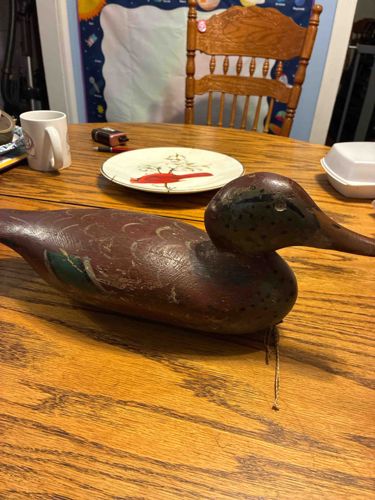
Vintage Wooden Mallard Duck Decoy
This appears to be a vintage wooden duck decoy, likely hand-carved, depicting a mallard duck. The decoy is characterized by its somewhat elongated body and a distinctly carved head and bill. The predominant colors are dark brown on the body, with visible remnants of a mottled green and black pattern on the head, indicating a male mallard plumage. There's also a patch of green paint on the lower side of the body, likely representing the 'speculum' feather group. The paint shows significant wear, chipping, and flaking across the entire surface, exposing the darker wood underneath in many areas, suggesting considerable age and use, possibly in water. This weathered appearance contributes to its vintage charm and collectible appeal. The texture appears somewhat rough, consistent with carved wood that has been painted. A thin, dark string or wire is visible near the tail end of the decoy, which would have been used for anchoring or retrieving it in the water. The eyes, though not perfectly clear, appear to be dark, possibly painted or small glass eyes. The craftsmanship indicates a hand-made piece, with slight irregularities in the carving and paint application. It would likely date from the mid-20th century or earlier, given the style and extent of wear. The overall condition suggests it was a functional decoy rather than purely a decorative item, which can add to its historical value.
AI-Generated Appraisal Disclaimer
Estimated Value
$150-300
Basic Information
Category
Folk Art / Decoy / Collectible
Appraised On
January 28, 2026
Estimated Value
$150-300
Item Description
This appears to be a vintage wooden duck decoy, likely hand-carved, depicting a mallard duck. The decoy is characterized by its somewhat elongated body and a distinctly carved head and bill. The predominant colors are dark brown on the body, with visible remnants of a mottled green and black pattern on the head, indicating a male mallard plumage. There's also a patch of green paint on the lower side of the body, likely representing the 'speculum' feather group. The paint shows significant wear, chipping, and flaking across the entire surface, exposing the darker wood underneath in many areas, suggesting considerable age and use, possibly in water. This weathered appearance contributes to its vintage charm and collectible appeal. The texture appears somewhat rough, consistent with carved wood that has been painted. A thin, dark string or wire is visible near the tail end of the decoy, which would have been used for anchoring or retrieving it in the water. The eyes, though not perfectly clear, appear to be dark, possibly painted or small glass eyes. The craftsmanship indicates a hand-made piece, with slight irregularities in the carving and paint application. It would likely date from the mid-20th century or earlier, given the style and extent of wear. The overall condition suggests it was a functional decoy rather than purely a decorative item, which can add to its historical value.
Get Your Items Appraised
Instant estimates of your treasures with AI-powered instant appraisals